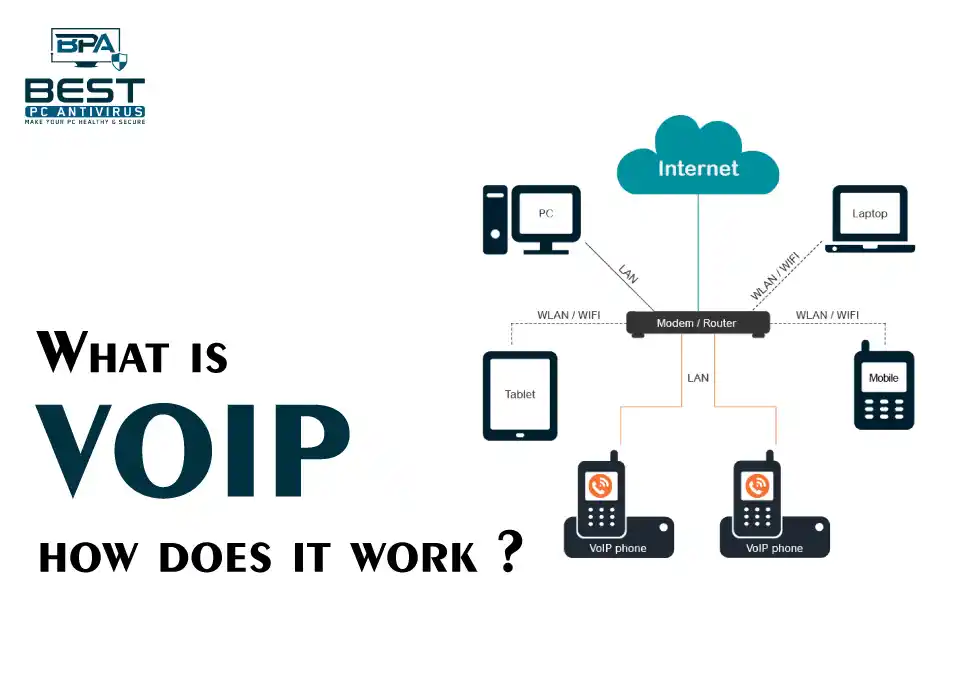To begin with, VOIP stands for Voice over Internet Protocol. It is basically a technology that allows voice communication and multimedia sessions over the internet. Essentially, it is a way to make phone calls over the internet rather than through traditional phone lines. Like WhatsApp phone calls or Instagram audio calls. With that on mind, let’s get into some detail-
VoIP Basics – What You Need To Know
If you’re new to Voice over Internet Protocol (VoIP) technology, here are some basic things that you need to know about VoIP:
Basic Point #1 Internet Connection
To use VoIP, you need a reliable high-speed internet connection, such as DSL, cable, or fiber optic. A poor internet connection can lead to poor call quality or dropped calls.
Basic Point #2 Voice over Internet Protocol Hardware
You’ll need a device to make and receive calls, such as a VoIP phone, computer, or mobile device. Some VoIP services also allow you to use a traditional phone with an adapter.
Basic Point #3 Voice over Internet Protocol Software
You’ll need VoIP software to make and receive calls, such as Skype, Zoom, or Teams. Some VoIP providers also offer their own software or web-based platforms.
Basic Point #4 Quality of Service (QoS)
QoS is a feature that ensures high-quality voice transmission over the internet. It prioritizes voice traffic over other types of internet traffic, ensuring that voice calls are not interrupted or degraded by other internet usage.
Basic Point #5 Voice over Internet Protocol Features
VoIP offers a range of features, such as call forwarding, voicemail, and caller ID, that are typically included with your service. Some providers also offer advanced features, such as video conferencing, instant messaging, and file sharing.
Basic Point #6 Voice over Internet Protocol Service Providers
There are many VoIP service providers available, each with their own features, pricing, and plans. It’s important to choose a provider that meets your specific needs and offers reliable service.
VoIP technology offers many benefits, including cost savings, flexibility, scalability, and advanced features. By understanding the basics of VoIP technology and choosing a reliable provider, you can enjoy high-quality voice communication at an affordable price.
How Does VoIP Technology Work?
Voice over Internet Protocol (VoIP) is a technology that allows voice communication and multimedia sessions over the internet. Here’s a detailed explanation of how it works:
Voice signals are digitized. When you make a call using VoIP, your voice signal is first converted from an analog signal to a digital signal. This process is called digitization, and it allows the signal to be transmitted over the internet.
Voice packets are created. Once the voice signal is digitized, it is broken up into small packets of data. Each packet contains a portion of the voice signal as well as information about the source and destination of the packet.
Packets are transmitted over the internet. The voice packets are then transmitted over the internet using the Internet Protocol (IP). This is the same protocol that is used to transmit data packets over the internet.
Packets are reassembled at the destination. When the voice packets reach their destination, they are reassembled into the original voice signal. This process is called packet reassembly, and it is done using the information contained in each packet.
Voice signal is sent to the recipient. Finally, the reassembled voice signal is sent to the recipient of the call, who hears it through their computer, phone, or other device.
VoIP technology allows for voice communication to be transmitted over the internet using digital packets. This technology offers several benefits, including cost savings, flexibility, scalability, and advanced features.
Benefits of VoIP Technology
There are many benefits of using Voice over Internet Protocol (VoIP) technology for voice communication, including:
Benefits of VoIP #1 Cost Savings
VoIP is typically less expensive than traditional phone services, making it an attractive option for individuals and businesses looking to reduce their communication costs. VoIP often includes features like unlimited calling, low international rates, and free on-net calling.
Benefits of VoIP #2 Flexibility
VoIP allows you to make and receive calls from anywhere with an internet connection. This means that you can work remotely, travel, or move your office without having to change your phone number or service provider.
Benefit of VoIP #3 Advanced Features
VoIP offers a range of advanced features, such as call forwarding, voicemail, caller ID, and conference calling, that are often included at no extra cost. This can help improve communication and productivity in the workplace.
Benefit of VoIP #4 Scalability
VoIP technology is highly scalable, allowing businesses to add or remove phone lines as needed without having to install new hardware or infrastructure. This makes it easy to grow or shrink your communication needs as your business changes.
Benefit of VoIP #5 Integration
VoIP technology can easily integrate with other communication technologies, such as video conferencing, instant messaging, and email. This can create a comprehensive communication system that is easy to use and manage.
Benefit of VoIP #6 High-Quality Voice Transmission
With proper setup, VoIP can provide high-quality voice transmission with clear sound and minimal delays. This can make it a reliable option for voice communication, even over long distances.
VoIP Security – Protecting Your Network from Unauthorized Access
VoIP security is an important aspect of using Voice over Internet Protocol (VoIP) technology. Here are some tips to help protect your network from unauthorized access:
Tip #1 Use Strong Passwords
Make sure that all user accounts on your VoIP system are protected by strong passwords. Avoid using default passwords, and require users to change their passwords regularly.
Tip #2 Enable Encryption
Enable encryption for all voice traffic to prevent eavesdropping and tampering. This can be done by using secure protocols like Transport Layer Security (TLS) or Secure Real-time Transport Protocol (SRTP).
Tip #3 Use a Firewall
Install and configure a firewall to protect your VoIP network from unauthorized access. Make sure that the firewall is configured to block all incoming traffic except for the ports required for VoIP traffic.
Tip #4 Keep Software Up-to-Date
Keep your VoIP software up-to-date with the latest security patches and updates to prevent vulnerabilities and exploits.
Tip #5 Limit Access
Restrict access to your VoIP system to authorized users only. This can be done by using virtual private network (VPN) connections or by restricting access to specific IP addresses.
Tip #6 Monitor Activity
Monitor your VoIP system for suspicious activity, such as unusual traffic patterns or multiple failed login attempts. This can help you detect and prevent attacks before they cause damage.
FAQs
What is VoIP?
VoIP stands for Voice over Internet Protocol, which is a technology that enables voice communication and multimedia sessions over the internet.
What are the basic requirements to use VoIP technology?
To use VoIP, you need a reliable high-speed internet connection, a device to make and receive calls such as a VoIP phone, computer, or mobile device, and VoIP software to make and receive calls, such as Skype, Zoom, or Teams.
What are some of the benefits of using VoIP technology?
Some benefits of using VoIP technology are cost savings, flexibility, scalability, advanced features, integration with other communication technologies, and high-quality voice transmission.
What is packet reassembly in VoIP technology?
Packet reassembly is the process of reconstructing the voice signal at the destination, using the information contained in each packet. This process takes place after the voice packets have been transmitted over the internet using the Internet Protocol (IP).
How can you protect your network from unauthorized access in VoIP?
You can protect your network from unauthorized access in VoIP by using strong passwords, avoiding default passwords, using firewalls, and implementing encryption for your voice traffic.
Read More : Cybersecurity: Securing the Retail Sector




